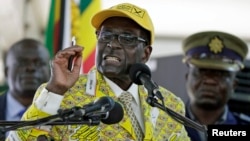Zanu-PF on Saturday ratified its constitution giving President Robert Mugabe excessive powers to nominate his deputies and chairman of the party.
The president also announced several resolutions aimed at improving the economy.
Addressing delegates at the party’s Congress, Justice Minister Emmerson Mnangagwa, who is also the Zanu PF secretary for legal affairs, announced the expected but controversial amendments to the party’s constitution, allowing President Mugabe to appoint his deputies in line with the 1987 Unity Accord between Zanu PF and the Zimbabwe African People’s Union (ZAPU), founded by the late Vice President Joshua Mqabuko Nkomo.
Many suspect the amendments to the constitution are aimed at protection Mr. Mugabe from the likes of Vice President Joyce Mujuru, who has been accused of factionalism and plotting to secretly oust him.
Opening up the speculation to Mrs. Mujuru’s fate, Speaker of Parliament Jacob Mudenda, said Congress had resolved to expel anyone suspected of spawning factionalism.
On the question of who President Mugabe will pick as his deputies, independent political analyst Sydney Masamvu, said the larger issue of succession, still remains.
Aside from addressing the party’s internal issues of factionalism and succession, the Congress also addressed matters of concern to citizens, as articulated by Small and Medium Enterprises Minister, Sithembiso Nyoni, who chaired the cluster on social services.
Another hot issue on the Congress’s agenda, was land reform, where Mudenda said they’ll be some changes.
Still on land, Agriculture and Mechanization Minister Joseph Made, who chaired the agricultural cluster, said new farmers can expect better support from the government to ensure food security in the country.
Made also said farmers would be required to sell an un-specified tonnage of their crop output to the Grain Marketing Board.
On infrastructure, Transport Minister Obert Mpofu announced Congress’s resolution to rehabilitate major roads before the Christmas holidays.
Other critical areas of concern to many citizens, are education and engagement with the West, both of which Mudenda said Congress has solutions, including engaging Britain and her allies to improve relations.
Analyst Masamvu said that resolution was overdue, but welcome.
Zimbabwe’s relations with the West were strained in 2000 following the imposition of targeted sanctions against President Mugabe, over allegations of rigged elections and gross human rights violations.
Harare, however, has maintained that the sanctions were punishment for its land reform program.





